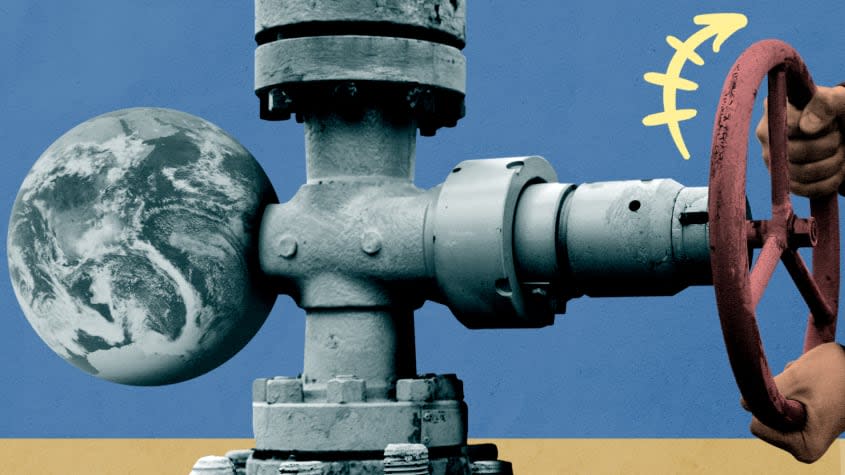What OPEC's latest move means for Biden and Putin

Gas prices are probably going to start rising again. OPEC and some of its fellow oil-producing countries in the expanded alliance known as OPEC+ — a group that includes Russia — this week announced they will be cutting oil production by 2 million barrels a day starting in November, part of "a bid to raise prices," The New York Times reports. That won't just affect drivers. The move should also undercut moves to deprive Russia of oil revenues as it conducts its war against Ukraine. Other possibilities: Europe may be driven into recession. And Democrats may falter in the November midterm elections if rising prices anger voters.
OPEC's move has sparked a backlash against one of the alliance's most powerful members, Saudi Arabia. U.S. leaders have long courted the kingdom's leaders. Perhaps no more. "From unanswered questions about 9/11 & the murder of Jamal Khashoggi, to conspiring w/ [Russian President Vladimir] Putin to punish the US w/ higher oil prices, the royal Saudi family has never been a trustworthy ally of our nation," Sen. Dick Durbin (D-Ill.) tweeted on Thursday. "It's time for our foreign policy to imagine a world without their alliance." How will OPEC's action affect American politics — and what does it mean for the future of the Middle East?
Domestic energy policy needs a big revamp
"In all its history, OPEC — and its new incarnation, the OPEC+ alliance — has never curbed output so much, and so quickly," Javier Blas writes for Bloomberg. There will be two major consequences of this act. First, rising oil prices "will keep inflation elevated for longer" which in turn means the Federal Reserve will keep raising interest rates which in turn means the American economy is more likely to face recession. Second, "it channels more money to the Kremlin" and lets it keep alive the war against Ukraine." It's also not a good look for American power, because the production cut "signals that Riyadh is in the Russian camp, willing to publicly snub Washington." That means it is time to boost every domestic means of energy production — oil and gas, yes, but also nuclear, wind, and solar. The lesson we should have learned by now? "Energy security is as important today as it was nearly half-century ago when the Arab oil embargo started. But security starts at home."
Biden's fist bump looks bad. So do his anti-oil policies.
Remember when President Biden fist-bumped Saudi Arabia's Crown Prince Mohammad bin Salman in July? That didn't really work out to America's benefit. "Like all his predecessors, Biden traveled to the kingdom to kiss the ring," David Harsanyi writes at The Federalist. The idea that Biden is a master of foreign policy "has been relentlessly debunked by reality. Even worse: His energy policy. While "Biden can't control prices," he could've alleviated the coming gas crunch by doing more to promote U.S. oil production. Instead, he revoked permits for the Keystone pipeline and halted oil-drilling leases on public lands. OPEC's move reveals the folly of "transitioning" to clean energy sources. "You can have windmills, or you can have affordable and reliable energy. You can't have both."
Are the Saudis siding with Russia?
OPEC's move seems to put Saudi Arabia in Vladimir Putin's camp, "a major change for a kingdom that has been a solid member of the U.S. camp since the 1940s," Jim Krane writes at Barron's. While the alliance has always had "hawks" who "perpetually push for production cuts that would raise prices," it is only now that the hawks are in control. Americans — not just their leaders — are partly responsible for this state of affairs: If more of us "drove Priuses or EVs than F-150s, these sorts of diplomatic spats wouldn't hurt as badly." Now, though, it looks as though Saudi Arabia is allying with Russia at the precise moment Putin is threatening the world with nuclear weapons. Assuming we survive that, "the question now is whether Saudi Arabia's tilt toward Russia will hold over the longer term, or whether it is a temporary response to mutual Saudi-Russian disdain for the Biden administration." In the short term, though, it sure looks bad for the United States. "Biden is certainly iced out."
It's time to end the 'alliance' with Saudi Arabia
"The U.S. gets very little out of these relationships" with Saudi Arabia and its neighboring oil kingdoms in the Middle East, Daniel Larison writes at Eunomia. While the U.S. provides Saudi Arabia with weapons for its defense — and which are used for its morally "atrocious" war in Yemen — it's difficult to see what America is getting in return. "Whatever benefits the U.S. may get from this arrangement are so paltry that they are barely worth mentioning." New legislation that would withdraw American troops from Saudi Arabia and the United Arab Emirates is a good step toward clarifying the costs and benefits of those arrangements. It's necessary for American leaders to demand OPEC countries to "take actions that prove that they can be reliable. It is long past time for their governments to reassure us."
You may also like
Survey reveals less than half of Americans plan to get flu shot this season
4 members of California family, including baby, found dead 2 days after abduction

 Yahoo Movies
Yahoo Movies 
